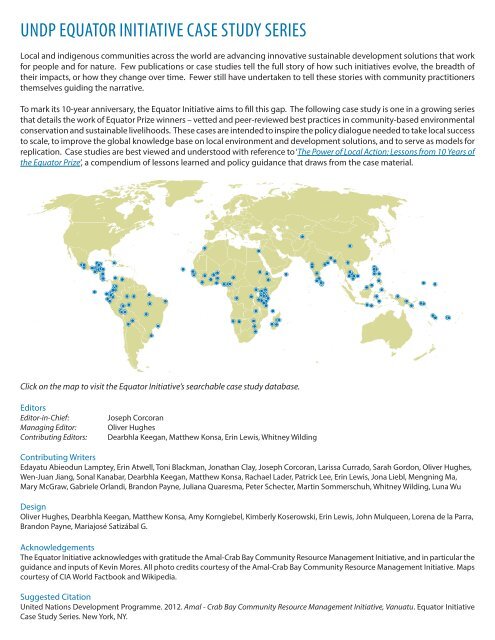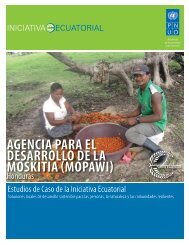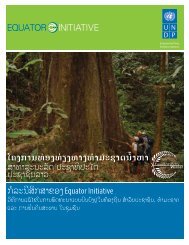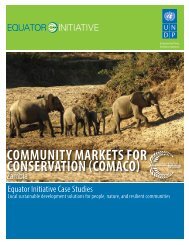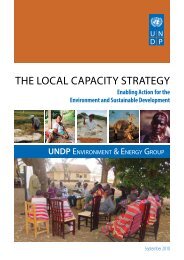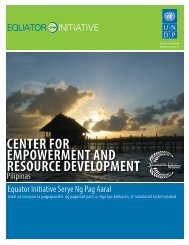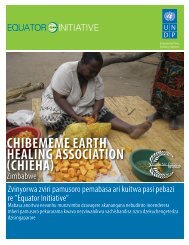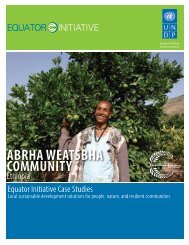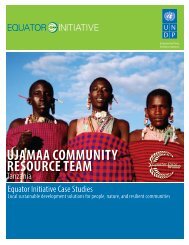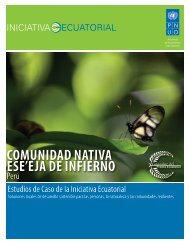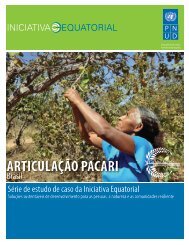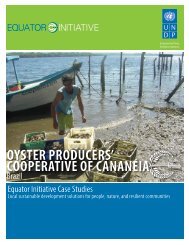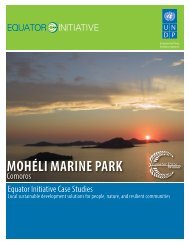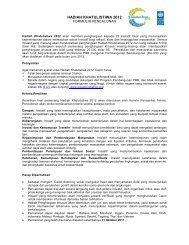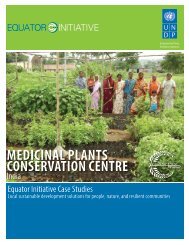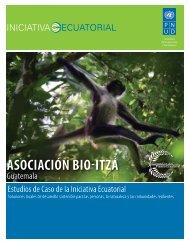AMAL-CRAB BAY Community Resource Management Initiative
AMAL-CRAB BAY Community Resource Management Initiative
AMAL-CRAB BAY Community Resource Management Initiative
You also want an ePaper? Increase the reach of your titles
YUMPU automatically turns print PDFs into web optimized ePapers that Google loves.
UNDP EQUATOR INITIATIVE CASE STUDY SERIES<br />
Local and indigenous communities across the world are advancing innovative sustainable development solutions that work<br />
for people and for nature. Few publications or case studies tell the full story of how such initiatives evolve, the breadth of<br />
their impacts, or how they change over time. Fewer still have undertaken to tell these stories with community practitioners<br />
themselves guiding the narrative.<br />
To mark its 10-year anniversary, the Equator <strong>Initiative</strong> aims to fill this gap. The following case study is one in a growing series<br />
that details the work of Equator Prize winners – vetted and peer-reviewed best practices in community-based environmental<br />
conservation and sustainable livelihoods. These cases are intended to inspire the policy dialogue needed to take local success<br />
to scale, to improve the global knowledge base on local environment and development solutions, and to serve as models for<br />
replication. Case studies are best viewed and understood with reference to ‘The Power of Local Action: Lessons from 10 Years of<br />
the Equator Prize’, a compendium of lessons learned and policy guidance that draws from the case material.<br />
Click on the map to visit the Equator <strong>Initiative</strong>’s searchable case study database.<br />
Editors<br />
Editor-in-Chief:<br />
Managing Editor:<br />
Contributing Editors:<br />
Joseph Corcoran<br />
Oliver Hughes<br />
Dearbhla Keegan, Matthew Konsa, Erin Lewis, Whitney Wilding<br />
Contributing Writers<br />
Edayatu Abieodun Lamptey, Erin Atwell, Toni Blackman, Jonathan Clay, Joseph Corcoran, Larissa Currado, Sarah Gordon, Oliver Hughes,<br />
Wen-Juan Jiang, Sonal Kanabar, Dearbhla Keegan, Matthew Konsa, Rachael Lader, Patrick Lee, Erin Lewis, Jona Liebl, Mengning Ma,<br />
Mary McGraw, Gabriele Orlandi, Brandon Payne, Juliana Quaresma, Peter Schecter, Martin Sommerschuh, Whitney Wilding, Luna Wu<br />
Design<br />
Oliver Hughes, Dearbhla Keegan, Matthew Konsa, Amy Korngiebel, Kimberly Koserowski, Erin Lewis, John Mulqueen, Lorena de la Parra,<br />
Brandon Payne, Mariajosé Satizábal G.<br />
Acknowledgements<br />
The Equator <strong>Initiative</strong> acknowledges with gratitude the Amal-Crab Bay <strong>Community</strong> <strong>Resource</strong> <strong>Management</strong> <strong>Initiative</strong>, and in particular the<br />
guidance and inputs of Kevin Mores. All photo credits courtesy of the Amal-Crab Bay <strong>Community</strong> <strong>Resource</strong> <strong>Management</strong> <strong>Initiative</strong>. Maps<br />
courtesy of CIA World Factbook and Wikipedia.<br />
Suggested Citation<br />
United Nations Development Programme. 2012. Amal - Crab Bay <strong>Community</strong> <strong>Resource</strong> <strong>Management</strong> <strong>Initiative</strong>, Vanuatu. Equator <strong>Initiative</strong><br />
Case Study Series. New York, NY.


